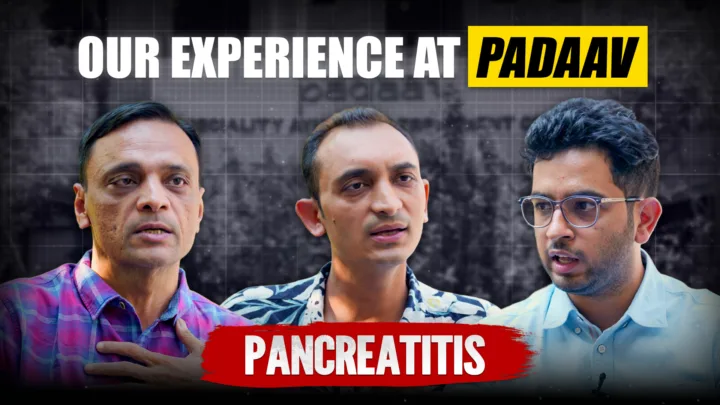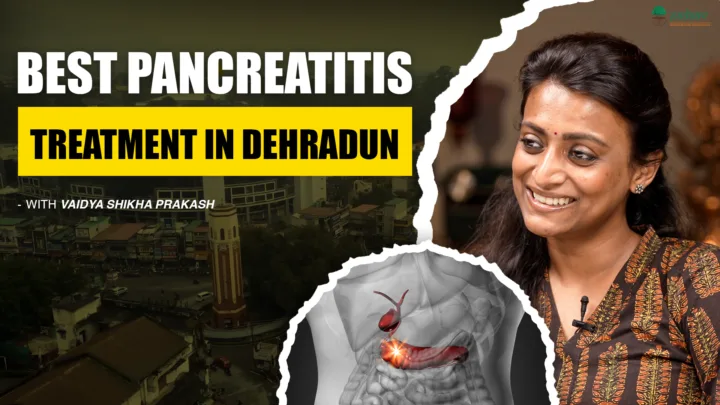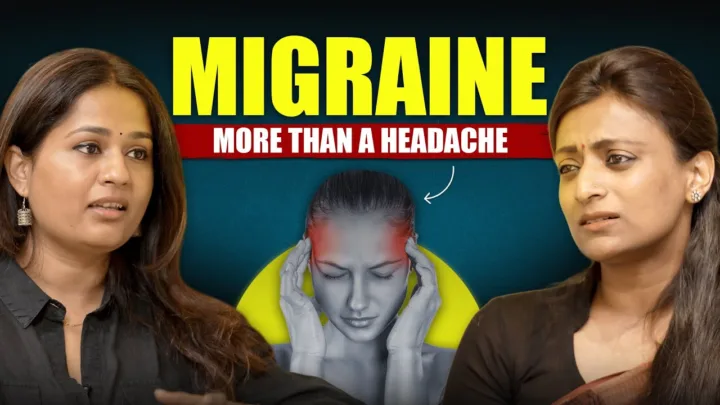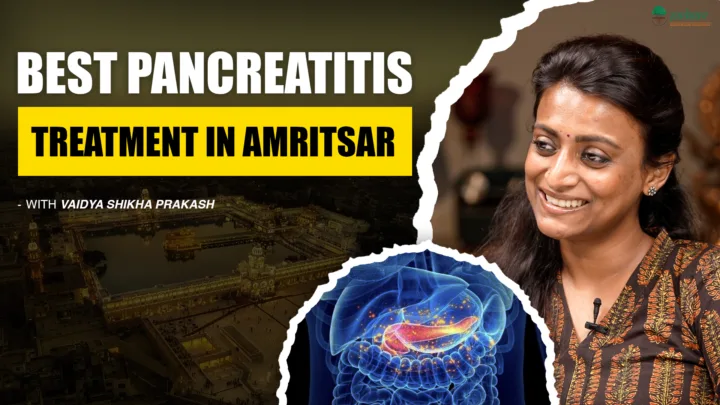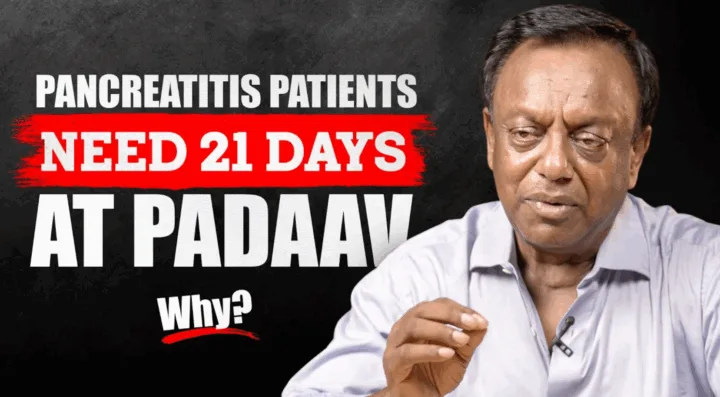Pancreatitis, a serious inflammatory condition of the pancreas, often comes as a sudden diagnosis, leaving many unfamiliar with this vital organ. The pancreas plays a crucial role in both digestion and blood sugar regulation. Here at Padaav Ayurvedic Specialty Treatment Center in Uttarakhand, we’ve spent over three decades successfully treating and managing pancreatitis with our evidence-based Ayurvedic approach.
What Exactly is Pancreatitis?
The word “pancreatitis” is quite descriptive, combining “pancreas” with “-itis,” meaning inflammation. Simply put, it’s the inflammation of the pancreas. Just like other inflammatory conditions you might be familiar with like hepatitis (liver inflammation), dermatitis (skin inflammation), or conjunctivitis (eye inflammation) pancreatitis can range significantly in its severity.
The Two Main Types of Pancreatitis
Pancreatitis primarily presents in two forms:
1. Acute Pancreatitis
This type strikes suddenly and is often severe. Patients typically experience:
- Sharp, excruciating abdominal pain that can be agonizing.
- Accompanying symptoms like vomiting, fever, and a rapid heart rate (tachycardia).
- Episodes that may unfortunately recur if the underlying issues aren’t addressed.
The pain is often described as unbearable, sometimes even “a pain worse than death,” making it a medical emergency that needs immediate attention.
2. Chronic Pancreatitis
Unlike its acute counterpart, chronic pancreatitis is a long-standing condition that leads to irreversible damage to the pancreas over time. Its symptoms tend to be more persistent and include:
- A dull, nagging abdominal pain.
- Steatorrhea (oily stools), a sign of malabsorption.
- General nutrient malabsorption, leading to fatigue.
- Common digestive issues like bloating, indigestion, and constipation.
- Chronic fatigue, muscle wasting, and noticeable unintentional weight loss.
Many patients with chronic pancreatitis experience a significant decline in their energy levels and overall vitality, impacting their daily lives.
Other Forms
Beyond these two main categories, there are several other specific types, each with its own nuances:
- Recurrent Acute Pancreatitis: This occurs when a patient experiences multiple, separate episodes of acute pancreatitis. After an initial acute attack, the inflammation resolves, but then another attack happens weeks, months, or even years later. It often points to an underlying, unresolved cause that continues to trigger these inflammatory episodes.
- Chronic Calcific Pancreatitis: This is a form of chronic pancreatitis characterized by the formation of calcium deposits (calcifications) within the pancreas. These calcifications can block pancreatic ducts, leading to further damage, pain, and impaired pancreatic function. It’s often associated with long-term alcohol abuse or genetic factors.
- Autoimmune Pancreatitis: In this rare type, the body’s own immune system mistakenly attacks the pancreas, causing inflammation and fibrosis. It’s often part of a broader autoimmune condition affecting other organs. Diagnosis usually involves specific blood markers and a response to steroid treatment.
- Necrotizing Pancreatitis: This is a severe complication of acute pancreatitis where parts of the pancreatic tissue, and sometimes surrounding tissues, die (become necrotic) due to the intense inflammation and enzyme activity. It’s a critical condition that can lead to infections, abscesses, and other serious complications, often requiring intensive medical or surgical intervention.
Each variant often has a distinct cause and, consequently, requires a tailored management strategy.
Unpacking the Causes: The TIGARO Framework
Understanding why pancreatitis occurs often involves looking at the TIGARO classification:
- T – Toxic or Metabolic: This includes factors like alcohol abuse and high triglyceride levels.
- I – Idiopathic: Sometimes, the cause remains unknown, even after thorough investigation.
- G – Genetic: A predisposition to pancreatitis can be inherited.
- A – Autoimmune: The body’s immune system mistakenly attacks the pancreas.
- R – Recurrent: A history of previous attacks can lead to more episodes.
- O – Obstruction: Blockages, often caused by gallstones, can trigger inflammation.
This framework is incredibly helpful for both patients and healthcare providers in pinpointing the root cause, which is essential for effective, long-term treatment.

How Pancreatitis is Diagnosed
Diagnosing pancreatitis typically involves a combination of crucial tests:
- Blood tests, especially checking amylase and lipase levels during an acute attack, along with complete blood counts.
- Imaging tests like CT scans and MRI/MRCP, which help assess structural changes, gauge the severity of the inflammation, and detect complications like necrosis or ductal obstruction.
Padaav Ayurveda’s Approach to Management
For over 35 years, Padaav has achieved remarkable success, treating more than 2,100 documented cases of pancreatitis using our well-established Ayurvedic approach. Our treatment philosophy is firmly built upon three core pillars:
- Aahar (Diet): Carefully planned dietary interventions.
- Vihaar (Lifestyle): Personalized adjustments to daily routines.
- Aushadhi (Medicine): Specific herbo-mineral formulations.
Together, these pillars form a comprehensive, individualized protocol designed to address both the immediate symptoms and the underlying cause of the disease.
Our Structured Treatment Plan
Our treatment journey is divided into two distinct phases, ensuring continuous care:
Phase 1: In-Residence Care (21 Days at Padaav)
The initial treatment phase begins at our center, where our primary focus is:
- Aggressive symptom management: Rapidly reducing pain, nausea, vomiting, and acute distress.
- Developing personalized diet and lifestyle plans crafted specifically for each patient’s unique needs.
- Closely monitoring and working to prevent any future attacks.
Phase 2: Long-Term Management (1-Year Home-Based)
After their time at Padaav, patients continue their journey at home with:
- A year-long regimen of herbo-mineral Ayurvedic formulations, with AMAR, our Government of India-patented flagship formulation for pancreatitis, being a central component.
- Regular follow-ups and continuous lifestyle guidance to track progress and ensure the benefits are sustained.
We also offer daily follow-up tracking, allowing patients to maintain their recovery comfortably from their own homes.
The Results We’ve Witnessed
Patients who successfully complete their full course of treatment at Padaav consistently report:
- Significant symptom relief, leading to a much-improved quality of life.
- No recurrence of acute attacks in the vast majority of cases.
- The ability to better manage minor flare-ups at home, without professional help.
- A drastically reduced need for hospitalizations.
- A profound restoration of their overall quality of life.
In many situations where conventional medicine offered little hope, we’ve seen Ayurveda empower patients to thrive once again.
Pancreatitis, often perceived as a lifelong or critically debilitating illness, can indeed be effectively managed and reversed through a structured Ayurvedic approach. At Padaav, our commitment goes beyond merely suppressing symptoms; we are dedicated to restoring complete health and vitality.
By combining the right diet, lifestyle adjustments, and targeted medicine, all guided by classical Ayurvedic principles and supported by modern diagnostic insights, patients can genuinely regain control over their lives free from constant pain and the recurring need for hospital visits.
At Padaav, we firmly believe that Ayurveda doesn’t just treat disease; it restores life.

